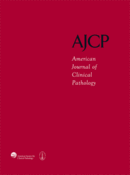-
PDF
- Split View
-
Views
-
Cite
Cite
Jeannette Guarner, Wun-Ju Shieh, Patricia W. Greer, Jean-Marc Gabastou, May Chu, Edward Hayes, Kurt B. Nolte, Sherif R. Zaki, Immunohistochemical Detection of Yersinia pestis in Formalin-Fixed, Paraffin-Embedded Tissue, American Journal of Clinical Pathology, Volume 117, Issue 2, February 2002, Pages 205–209, https://doi.org/10.1309/HXMF-LDJB-HX1N-H60T
Close - Share Icon Share
Abstract
Yersinia pestis infection usually is limited to lymph nodes (bubo); rarely, if bacteria are aerosolized, pneumonic plague occurs. We developed an immunohistochemical assay using a monoclonal anti–fraction 1 Y pestis antibody for formalin-fixed tissues. We studied 6 cases using this technique. Respiratory symptoms were prominent in 2 cases; histologically, one showed intra-alveolar inflammation, and the other had alveolar hemorrhage and edema. By using the immunohistochemical assay, we found intact Yersinia and granular bacterial antigen staining in alveoli, bronchi, and blood vessels. Of the remaining cases, 2 had septicemia and 2 had a bubo. Pathologic changes included lymphocyte depletion, necrosis, edema, and foamy macrophages in lymph nodes; multiple abscesses in the spleen; fibrin thrombi in glomeruli; and unremarkable lungs. By using the immunohistochemical assay, we identified intact bacteria inside monocytes and granular antigen staining in blood vessels. The immunohistochemical assay provided a fast, nonhazardous method for diagnosing plague. The immunohistochemical assay localizes bacteria, retaining tissue morphologic features, and can help define transmission mechanisms.




